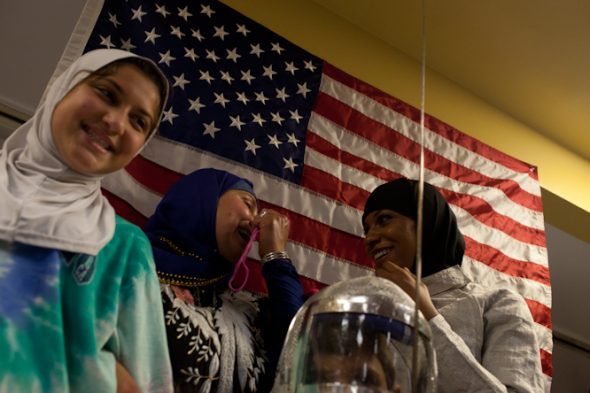
By Aman Ali
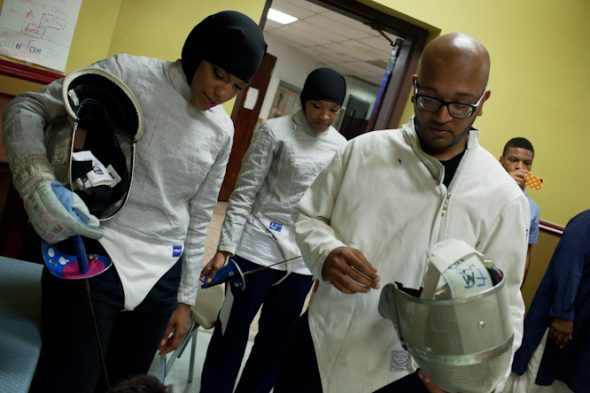
Ibtihaj Muhammad stares me down as I lace up my Puma sneakers and grasp my fencing sabre. One of us is a world-class fencer training for the U.S. Olympics team. The other has played a Star Wars lightsaber game a few times on Nintendo Wii.
The five-point match begins. I dash forward and my sabre grazes her side. I’m stunned I was able to score a point on her, but hey I’ll take it. The Slumdog Millionaire song “Jai Ho” reverberates in my brain as my head is temporarily filled with delusions I have a chance to beat her.
Next point, I take a brief second before I attack and notice an opening on her left arm. I lunge towards her with the hopes of striking her. I miss. My sabre whiffs in the air and she responds by essentially smacking me in the face with the broadside of her weapon.
The song in my head stops. I lose 5-1.
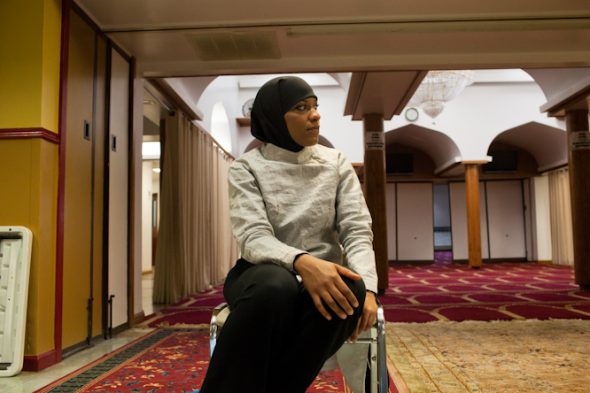
Ibtihaj takes a question from the eager audience.
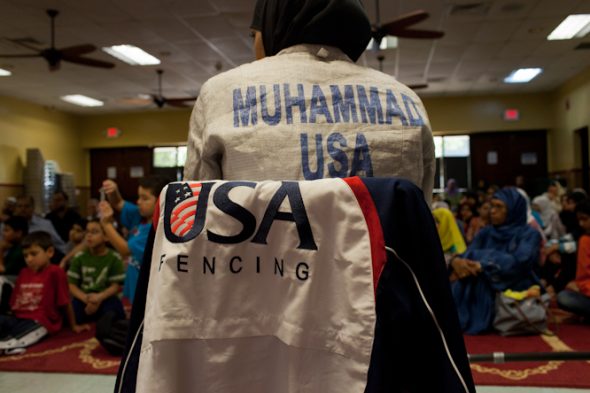
The crowd.
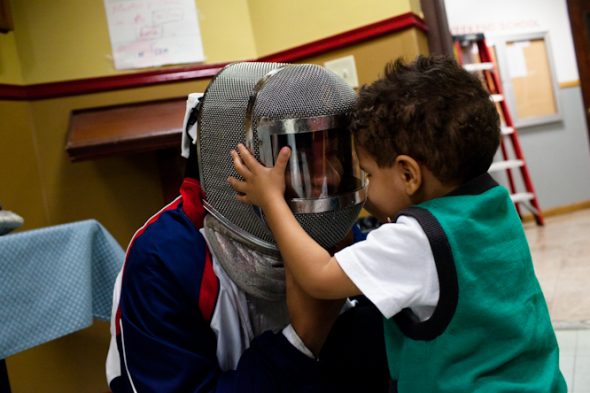
Ibtihaj dons her mask with the help of her nephew.
Ibtihaj has gained massive attention as of late not only because of her skills but the fact that she’s a practicing Muslim and wears the headscarf. When she travels around the world for tournaments, she’s often mobbed by fans such as the time she went to France last year in midst of the country’s whole burqa-banning bonanza.
“I was swarmed by the French press and literally had hundreds of kids asking me for my autograph,” she said. “I was almost ejected from the event because I was so busy signing these autographs.”
“When you go abroad, you think people are afraid of Muslims,” she added. “But you almost become an ambassador for the Muslim community here in America, whether or not I like to. I wear the hijab so people see the United States logo on my uniform and are curious more so than anything.”
One of the reasons she took on fencing was she wanted to play a sport that didn’t restrict her desire to dress modestly as a Muslim woman. She played volleyball in high school but oftentimes felt awkward doing it.
“The fact that I wore hijab, I couldn’t wear the tank top that they wore for the matches,” she said. “ I had to wear long sleeves. I couldn’t wear the spandex they wore because I had to wear sweatpants. I stood out like ‘Here’s Team Ibtihaj and here’s the rest of the team.’”
Earlier in the day, I met up with her in New York City to watch her train at a fencing studio in Manhattan. Her feet thunder towards her sparring partner Luther with the hopes of intimidating him. She tricks Luther to move forward by twirling her sabre around in a tease. She responds by crossing over to his other side and striking him with a winning blow.
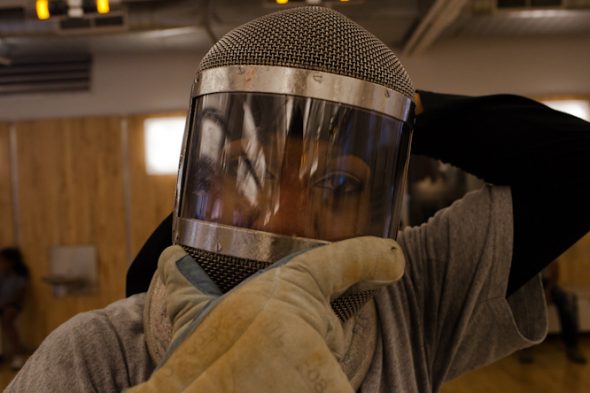
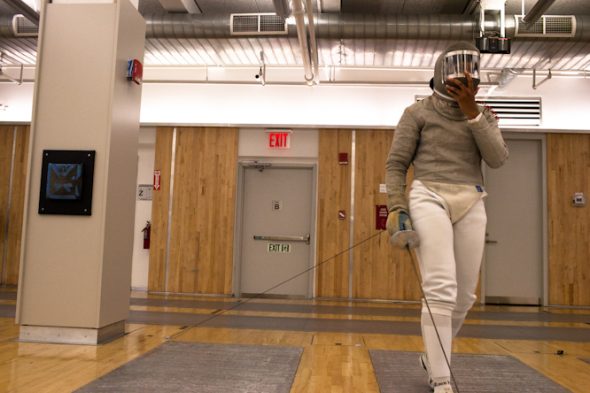
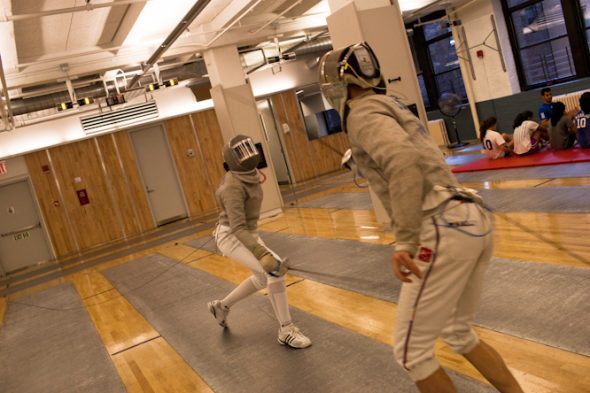
She and I broke our fast later in the day at the Islamic Society of Central Jersey. The mosque there promoted our arrival there by advertising the community that we were going to fence each other inside the mosque. Over 200 people showed up to watch me get destroyed.
We both talked massive trash with each other leading up to the fight and after I lost, I asked her where she gets her strong sense of competition from.
“I’m very competitive by nature,” she said. “Like if we were playing checkers right now, I’d probably try to kill you in that too.
“Now that I can beat you in,” I replied back, pondering if I should load up the checkers app on my smartphone and let her know what’s up.
“Ok fine, I’ll probably lose, but I’m super competitive,” she replied. “Even when my sister and I are walking up the stairs from the train, we’ll race up the stairs. I can’t help it.”
Her competitive spirit also comes from her parents. Her father Eugene, a retired cop, said he and his wife pushed all their kids into playing sports.
“It occupies their time and doesn’t leave their time for idle stuff,” he said. “We figured between the homework and being involved in sports, they wouldn’t be involved in other activities that leave down a negative road.”
Ibtihaj trains full time as a fencer. Several fencing committees provide her grants to travel the world and compete in tournaments. The United States will only choose two women to represent them next year at the 2012 Olympics and she stands a good chance in making the cut. With all the attention she gets as of late, I ask her what I’ve been asking a lot of people on this trip, how she keeps herself in check.
“I never want to think too highly of myself because when you do, you’ve almost defeated yourself,” she said. “There’s nothing left for you to accomplish. If I don’t think of myself in the highest level, I know there’s still more I can attain and goals I can reach.
“You know, I am always shocked when people want my autograph or a picture with me,” she added. “But when you’re praying five times a day and keeping Allah in mind, I think it’s hard to lose yourself in the grandiose idea of stardom.”
Many of the people that came to the mosque to see her fence are young Muslim girls. They swarm her after the match asking her all sorts of questions. She said she’s embraced her public role with the hopes it can encourage young Muslim girls to excel at sports too.
By competing so intensely with some of the world’s best athletes, I asked her how she handles defeat.
“I’m never fully satisfied,” she said. “I feel like I always leave a competition upset at myself. Sometimes I come home feeling defeated even though I’ve made a final or two. I’m always critiquing myself and figuring out a way to some day (God willing) to win.”
I follow up by asking her how critiquing herself doesn’t lead to low self-esteem and insecurity.
“It’s tough to find that balance. My mom has to remind me all the time about how good I actually am. I think modesty is a huge part of being a good athlete. Look at Muhammad Ali, sure he portrayed publicly as an overly confident and cocky guy, but he’s a human being and at some level he had to be self-conscious.”
Her younger sister Faizah also fences. Ibtihaj said whenever she spars with her, she refuses to go easy on her.
“My sister is naturally gifted and has a natural knack for fencing,” she said. “For me, I always had to work hard to be good at it. I want her to realize if she took her natural abilities to work hard, she could be one of the best fencers in the world.”
Being in the public spotlight also comes with the territory of random people trying to holler at you, something I know too well.
“It’s funny when people in the audience are trying to propose to you when you walk into the match getting ready to fence like in one time when I was in Tunisia,” she said. “But I try to make light of everything because funny things always happen when you travel abroad.”
Being a formidable female athlete, I’m wonder if men find her to be intimidating.
“I think people find my personality intimidating period,” she said with a laugh. “I can be abrasive and sometimes curt. I feel like people would find that more offputting than me being an athlete.”
Her parents do ask her about when will she settle down and get married, but her father tells me they try not to pressure her.
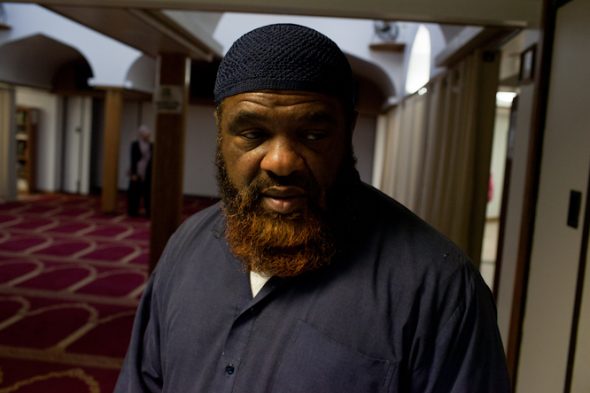
The father unit.
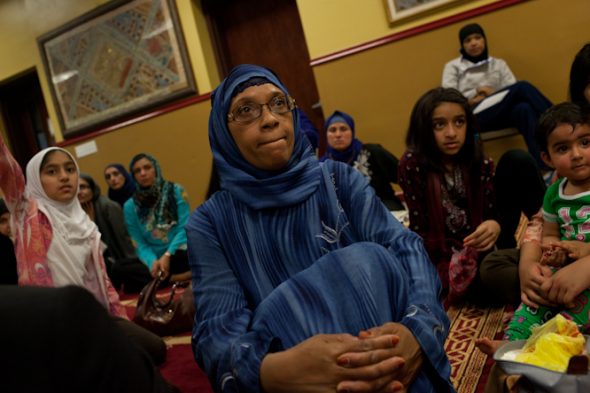
The mom-inator.
“She’s had people inquire about her before” he said. “I tell them right now she’s so focused on fencing that even if she got married now, it might be a detriment to her marriage because she’s gone all the time.”
Sorry fellas.
Right now, she’s focused on training for the Olympics and trying to connect with young people interested in fencing.
“I remember when I started fencing, how mean some of the older athletes were to me,” she said. “So I always try to remind myself with these kids that I was once in their position. Even saying hi to them goes a long way. These kids, you’re the Michael Jordan of fencing to them. It’s really humbling to know that someone thinks that much of you when I feel like I’ve barely done anything and just getting started.”
